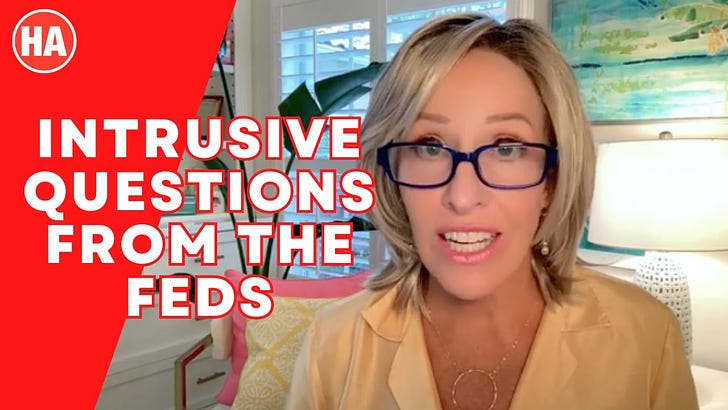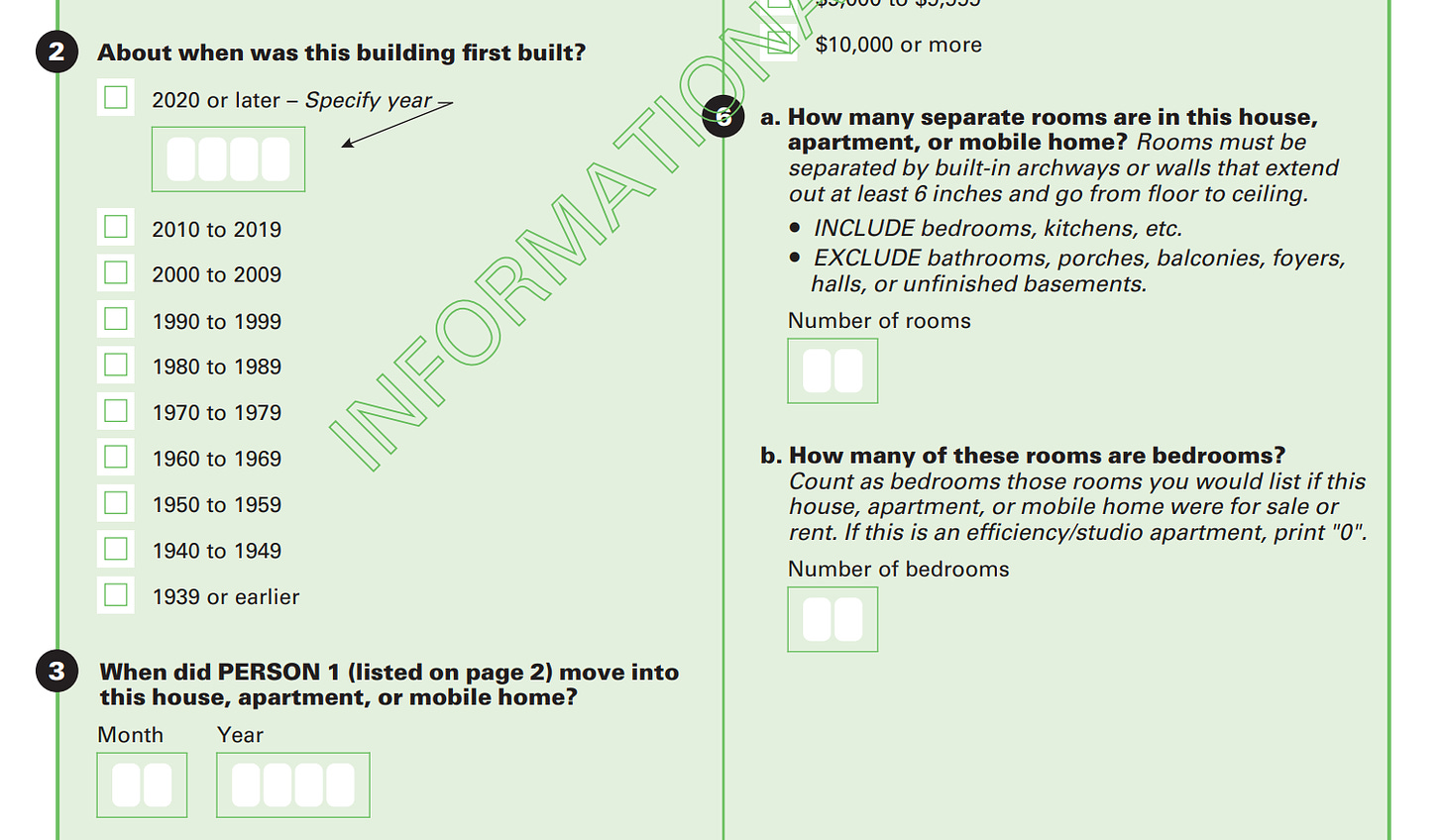In my video above, I share a letter from a concerned Healthy American regarding answering questions from the American Community Survey (ACS). She’s not alone in her skepticism because this questionnaire just didn't sit right with me on multiple levels.
"Dear Peggy, You requested future topics, and I recently received a lengthy survey from the US Census Bureau. Honestly, I initially thought it was a scam. I'm fairly certain the next census is in 2030. Well, apparently, there's something called the American Community Survey, and it states that we're required by law to complete it. Of course, it's quite invasive. I asked several neighbors and friends about the current US Census American Community Survey, and they hadn't received one. Now, I've received a final notice to complete it, or someone will come knocking at my door. Anyway, we'll see what happens. My husband believes they don't have enough people to go knocking on people's doors. What are your thoughts on it? What's the history behind it? Why are they conducting it? What happens to people who refuse to participate? I would appreciate your insight on it. With gratitude and blessings, Cynthia."
Did you know that the American Community Survey is sent out to over 3.5 million households annually? It's a massive effort by the Census Bureau to “gather detailed information about our communities.” And being a business owner, I got one of these surveys too. They kept bugging me for info until I finally gave in and provided some... let's just say, creative answers. But even after I completed it, those pesky letters kept flooding in. So rest assured, this is a giant bureaucracy and it’s highly unlikely someone will come knocking on your door.
This survey isn't your run-of-the-mill census that is just grabbing a headcount of how many people live in your household – it's an invasive inquiry into your personal business, asking everything from your family tree to your monthly bills and health status.
Click here to read the ACS survey.
Let's not jump to conclusions here, but maybe the government is just checking to see how many rooms you've got available for the influx of “new visitors.” You know, those “new visitors” who don’t actually have plans to leave and who seem to have a knack for taking cash handouts from your hard-earned tax money? Oh no, no conclusions there! I mean, they wouldn't possibly want to know the number of bedrooms you've got to possibly accommodate these folks in the dystopian future, would they?
This survey is unbelievably invasive. They want to know about your health insurance, whether you're paying for it, or if you receive tax credits. They're prying into your marital status, asking if you've been married, widowed, or divorced. It's absolutely stunning! And it doesn't stop there… They want to know random health information like if you or anyone in your household has difficulty concentrating, remembering, or making decisions due to physical, mental, or emotional conditions? It's endless!
Does the government really need all this information? They're digging into your military history, asking about your grandparents... Do they have anything about pets? They're asking about your employment status, whether you work for-profit, nonprofit, local government, state government, and the list goes on. They want details about your Social Security, retirement, income, wages, salary, commissions... Are you kidding me?
And they're trying to scare you into thinking you'll get fined or worse if you don't spill the beans. But let me tell you, I did some digging, and turns out, enforcement penalties for non-compliance are rare.
Participation in the U.S. Census is a civic duty, enshrined in federal law, with the aim of accurately counting every person residing in the United States. Mandated by Title 13 of the United States Code, the U.S. Census is conducted every ten years, with the primary goal of providing a comprehensive snapshot of the nation's population. This data is vital for determining the allocation of congressional seats, distributing federal funds, and informing decision-making at all levels of government.
The main difference between the US Census and the ACS survey is the frequency. The ACS is conducted on an ongoing basis, surveying a smaller portion of the population every year.
There was actually a case in January of 2023 that was disputing the very constitutionality of the ACS survey: Maureen Murphy, Et Al v. Gina Raimondo, Et Al.
In this case, plaintiffs Maureen Murphy and John Huddleston challenged the requirement to complete the American Community Survey (ACS), arguing that it violated their constitutional rights. They believed that being forced to provide information for the survey went against their rights to privacy and freedom of speech.
However, the court found that their claims were not ripe (AKA it wasn’t ready to be decided). To be heard in court, a case needs to present a real and immediate issue, but the judge felt that Murphy and Huddleston hadn't faced any real threat of punishment for not completing the survey. In fact, nobody had been punished for skipping the survey in over 50 years and they emphasized several times throughout their discussion how there is really no intention to prosecute people for not completing the survey.
Defendants submit a declaration from Donna Dailey, Chief of the ACS, who asserts “the Census Bureau does not threaten non-responding addresses with the enforcement of fines or with referral to DOJ for prosecution” and that the contacts described in Plaintiffs’ complaint are consistent with the procedures used by the ACS to encourage completion of the survey. (Dkt. No. 22-1 at 4, 6.) Dailey also asserts “[i]n the history of the ACS, no one has ever been prosecuted for failing to respond to the ACS” and that “the Census Bureau has never referred anyone to DOJ for prosecution and DOJ has never prosecuted anyone for failing to respond to the ACS.”
In the end, the judge dismissed the case without making a decision. This means that Murphy and Huddleston's complaint wasn't considered because it wasn't ripe for a court decision. However, if the plaintiffs were to receive real threats of prosecution in the future, they could potentially bring their case back to court. If that were to happen, the constitutionality of the Census Bureau's authority to compel responses to the American Community Survey would then be able to be discussed and debated extensively by the court.
In short, getting fined or punished for not participating the U.S. Census or surveys is more like an empty threat. The Census Bureau's primary focus is on promoting participation through educational campaigns and outreach efforts, rather than resorting to punitive measures. If someone doesn't respond, the Census Bureau typically estimates their information using other data — and we all know they already have access to most the data they need to fill in the blanks anyway.





Oh my! The ACS! My Dad received his survey last year in January and round filed it. They sent several more copies. All round filed. Then, in January of this year, he came home one day, and there was a packet on his door, along with a note. In the packet was that infamous survey and a note to please fill it out. Oh, I forgot about the phone calls that he was getting beginning at the end of last year asking him to fill it out or he could just answer the questions verbally.
He came home another day and found the guy's card again, and more calls. Then, he called MY HOME PHONE!!! He left a message because we do not answer unkown phone numbers. Said he was trying to reach my Dad and it looked like the house was maybe closed up for the winter and if I was the correct person that I could answer the questions or get a message to my Dad. The audacity. He also called my Dad that day as well. We are all getting real ticked by now. Another call to my home and to my Dad, then, he called MY SISTER'S PHONE. She has a California number, but lives in Mexico! She answered the phone but said she was driving so he said ok, just let your Dad know! Then, as I was on the phone with my Dad, I get a TEXT ON MY CELL PHONE! Well, I just lost it! I texted back some very un-Christian things to him and told him to stop harrassing our family. I repented of my anger. Anyway, my Dad finally decided to call the guy. My Dad talked to him for an hour, but never answered any of the questions. Said the guy was very nice and apologized that yes, even though his supervisor said it was ok to do, it was probably over the line.
Apparently, per their website, the ACS is so that communities know how to 'plan for the future' and to get funding from the feds for programs. Yeah. Sure. Whatever.
Hi Peggy,
I think a person can just write "Refused - Return to Sender" on the envelope and put it back in their mailbox for postman/woman to pick up the net day in outgoing mail? Or, sometimes I write "Deceased - Return to Sender" on envelope when I think it is junk mail so they stop sending stuff.